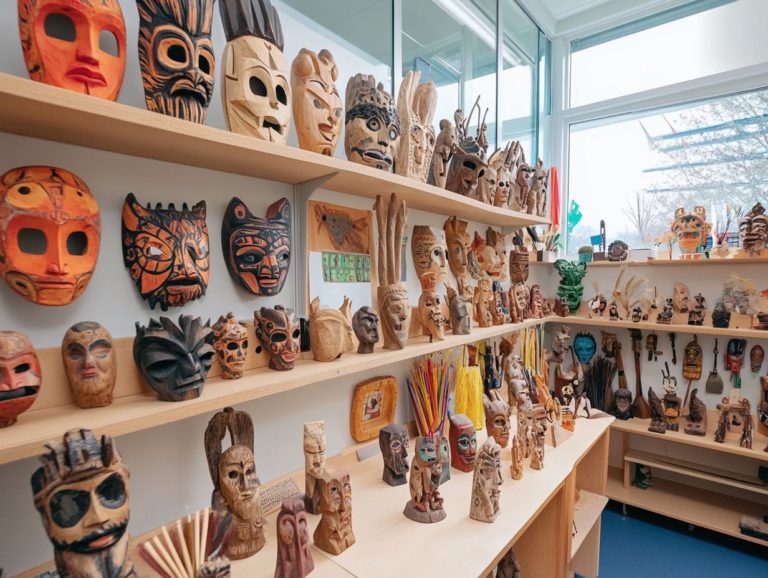the impact of globalization on local languages
Globalization has fundamentally transformed the world, weaving together cultures and economies in big ways.
This interconnectedness enriches our lives but also brings significant challenges, especially for local languages. As dominant languages expand their reach, many smaller tongues are at risk of vanishing, threatening to erode cultural identity and heritage.
This article delves into the impact of globalization on language usage. We examine the struggles faced by local languages and the crucial efforts being made to safeguard them.
Discover how technology serves both as a beacon of hope for preservation and a source of potential setbacks. Engage with us as we unravel the complex relationship between globalization and our linguistic landscape.
Contents
- Key Takeaways:
- Defining Globalization and its Effects on Culture
- How Globalization Affects Local Languages
- Challenges Faced by Local Languages
- Act Now to Preserve Local Languages in a Rapidly Globalizing World
- Efforts and Strategies for Language Preservation
- The Role of Technology in Language Preservation
- Advancements in Language Learning and Preservation
- Potential Drawbacks and Criticisms
- Frequently Asked Questions
- How does globalization impact the use and preservation of local languages?
- What are the main factors driving the impact of globalization on local languages?
- How does the dominance of English as a global language contribute to the impact of globalization on local languages?
- What are some consequences of the impact of globalization on local languages?
- Is there anything being done to address the negative impact of globalization on local languages?
- What can individuals do to support the preservation of local languages in the face of globalization?
Key Takeaways:

- Globalization can lead to the loss of cultural identity.
- Economic and social factors challenge local language preservation.
- Technology helps but can also complicate language preservation.
Defining Globalization and its Effects on Culture
Globalization is the intricate process through which cultures, economies, and societies around the world become interconnected. This often leads to big changes in local customs, traditions, and identities.
This phenomenon reshapes cultural landscapes, frequently resulting in the dominance of Western ideals while presenting unique opportunities for cultural exchange and development.
By diving into the implications of globalization on local cultures and identities, you can gain a deeper understanding of how this complex interplay influences education, media, and communication in various contexts, particularly in regions like India, China, and Latin America.
How Globalization Affects Local Languages
Globalization profoundly shapes local languages by elevating the prominence of widely spoken tongues like English. At the same time, this poses a threat to the survival of non-English languages.
This dynamic creates both opportunities and challenges in terms of communication and cultural preservation. As global markets expand, the demand for effective communication in English enhances its significance. Yet, it also raises pressing concerns about the erosion of linguistic diversity and the potential loss of cultural identity tied to local languages.
Language Shift and Loss of Cultural Identity
Language shift is when a community stops speaking their native language and starts using another. This often leads to a significant loss of cultural identity and heritage. This phenomenon is especially noticeable in regions where globalization has increased exposure to and dependence on English, causing local languages to dwindle and cultural expression to suffer.
Consider indigenous populations in places like the Amazon rainforest. They face immense challenges as their native tongues fade, resulting in a disconnect from ancestral customs and traditions. Likewise, communities in the Pacific Islands are witnessing their languages diminish as younger generations gravitate toward more widely spoken languages in pursuit of economic opportunities.
These shifts jeopardize the linguistic diversity of these areas and erode the unique cultural narratives that define them. Many communities are now taking proactive steps to preserve their heritage through education, cultural events, and language revitalization programs.
By nurturing connections among community members and encouraging the use of native languages in everyday life, they resist the encroaching tide of language shift. This helps reinforce their cultural identity and heritage.
Influence on Language Use and Communication
The impact of globalization on language use and communication is remarkable. As English increasingly emerges as the common language in business, media, and education, you encounter both enhanced opportunities and complexities in your interactions.
This change often prioritizes English over local languages. It affects cultural nuances and local contexts.
In various environments, from corporate boardrooms to casual social gatherings, adopting English allows for smoother dialogue among diverse groups. This fosters collaboration and innovation. However, this widespread use raises valid concerns about the erosion of local dialects and customs, as unique expressions and traditions may risk being overshadowed or lost.
While you might embrace the chance to engage in a global economy and connect with a broader audience, it s understandable to worry about the marginalization of your native language and identity. This linguistic homogenization can diminish the richness of human expression and cultural heritage, leaving you to navigate a delicate balance between global connection and local identity.
Challenges Faced by Local Languages

Local languages face many challenges in the context of globalization. These range from declining usage in education and public life to insufficient government support for preserving linguistic diversity.
These issues are particularly evident in areas where English dominates, highlighting the urgent need for strategic interventions to safeguard and promote local languages.
Economic and Social Factors
Economic and social factors significantly influence the challenges faced by local languages. Communities often prioritize economic advancement over language preservation in our increasingly globalized world.
This focus diminishes opportunities for local languages in education and professional contexts, further contributing to their decline.
For instance, in regions where a dominant global language is favored in academic institutions, you might notice students becoming disengaged from their native tongues. This leads to a gradual erosion of their linguistic heritage.
Educational policies that stress proficiency in economically advantageous languages marginalize local dialects, creating a regrettable cycle of disuse. When communities make decisions driven by the promise of better job prospects, the situation worsens.
Younger generations may feel compelled to abandon their ancestral languages for those that seem to offer greater economic opportunities. The intricate relationship between globalization and localized educational practices plays a crucial role in shaping the future of these vulnerable languages.
Lack of Government Support
A significant challenge with local languages is the lack of government support for their preservation and promotion amidst globalization. Without adequate policies and funding, many languages struggle to find their place in educational curricula and public discourse, leading to a steady decline.
This decline affects both the languages and the communities that speak them. When local languages begin to fade, intricate traditions, histories, and knowledge systems risk disappearing entirely.
Successful initiatives, like Taiwan’s promotion of indigenous languages through educational programs, illustrate the profound impact that targeted government support can have in revitalizing local tongues. This inspires younger generations to embrace their linguistic heritage.
Policymakers must act now to implement mandatory language courses in schools and fund community workshops. By fostering an environment where local languages can thrive, you can help ensure their survival against the relentless tide of global influences.
Act Now to Preserve Local Languages in a Rapidly Globalizing World
Preserving local languages demands thoughtful strategies that champion linguistic diversity and cultural identity.
By focusing on education, fostering community engagement, and advocating for supportive government initiatives, you can play a pivotal role in this essential endeavor.
As globalization reshapes the landscape of language, it becomes imperative to implement effective measures that empower communities to not only maintain but also revitalize their native tongues.
Efforts and Strategies for Language Preservation
Your strategies for language preservation can include creating local language classes, organizing community workshops, and using technology to revitalize linguistic heritage. These steps counter globalization’s impact on local languages and ensure they remain relevant in today s society.
Many communities are leveraging innovative tools to promote language learning and usage. For example, in New Zealand, integrating the M ori language into school curriculums has sparked renewed interest among younger generations.
Technology is a game changer, with mobile apps and online platforms developed to make language learning resources more accessible than ever.
Community-driven workshops reinforce language skills and boost the confidence of speakers. These combined strategies show how local efforts, enhanced by modern technologies, can effectively bridge generations and keep local languages alive.
The Role of Technology in Language Preservation

Technology increasingly serves as a crucial ally in preserving language, offering innovative platforms that facilitate learning and promote local languages.
This is especially important in the face of globalization, which often elevates dominant languages at the expense of cultural diversity.
With mobile apps and online courses available, technology presents unique opportunities to engage younger generations with their linguistic heritage. It ensures that their voices resonate in a world that tends to favor the mainstream.
Advancements in Language Learning and Preservation
Recent advancements in technology have dramatically transformed language learning and preservation efforts, granting access to resources that were once out of reach for many communities.
These innovations create remarkable opportunities for you and your community to actively engage with your languages, nurturing a strong sense of identity and cultural pride.
Mobile applications like Duolingo and Babbel have made language learning more accessible, allowing practice anytime and anywhere.
Platforms such as Rosetta Stone use adaptive learning technologies to customize lessons to your learning style, enhancing both retention and effectiveness.
Communities benefit immensely from digital archives dedicated to preserving endangered languages. These archives facilitate collaboration among speakers and linguists globally.
These tools streamline language acquisition and foster greater community engagement, cultivating a vibrant, supportive environment where individuals of all ages can partake in cultural exchange and immersive experiences.
Potential Drawbacks and Criticisms
While technology offers remarkable advantages for language preservation, it’s exciting to explore its potential drawbacks and criticisms, particularly regarding equity and accessibility.
The digital divide can deepen existing inequalities, leaving some communities without the necessary resources to preserve their languages effectively.
Marginalized communities often see their languages underrepresented in digital spaces, as technology tends to favor widely spoken languages due to insufficient resource allocation for less common tongues. This imbalance raises important questions about whose voices are amplified and whose are silenced.
To address these challenges, community-driven projects and collaborations with non-profit organizations can play a crucial role. By promoting local engagement in content creation and offering training in technological skills, you can help ensure that all languages have a fair shot at thriving.
Frequently Asked Questions
How does globalization impact the use and preservation of local languages?
Globalization has led to the dominance of a few major languages, resulting in a decline in the use of many local languages. This has led to the loss of linguistic diversity and the potential extinction of some smaller languages.
Act now to ensure these languages thrive!
What are the main factors driving the impact of globalization on local languages?

The rise of international trade and migration is reshaping local languages. Media and technology often prioritize a few dominant languages over others.
How does the dominance of English as a global language contribute to the impact of globalization on local languages?
English has become the dominant language in many areas of business, education, and media. This shift has changed attitudes towards English; it is now often seen as the preferred language for communication and education.
What are some consequences of the impact of globalization on local languages?
The impact of globalization can result in language loss and cultural homogenization. This trend decreases the variety of languages and can lead to the loss of traditional knowledge tied to these languages.
Is there anything being done to address the negative impact of globalization on local languages?
Exciting efforts are underway to preserve and promote local languages. Programs are actively working to revitalize these vital forms of communication, but often face challenges like lack of funding.
What can individuals do to support the preservation of local languages in the face of globalization?
Individuals can support local language communities by learning and using their languages. Advocacy for language rights and recognition of the cultural significance of local languages is equally important.





